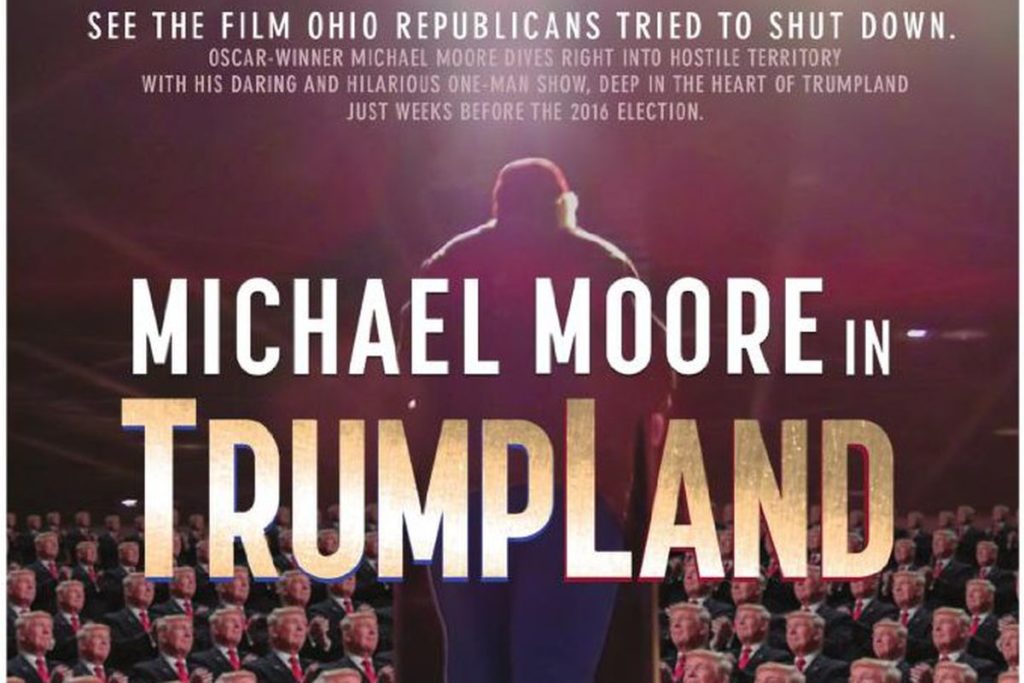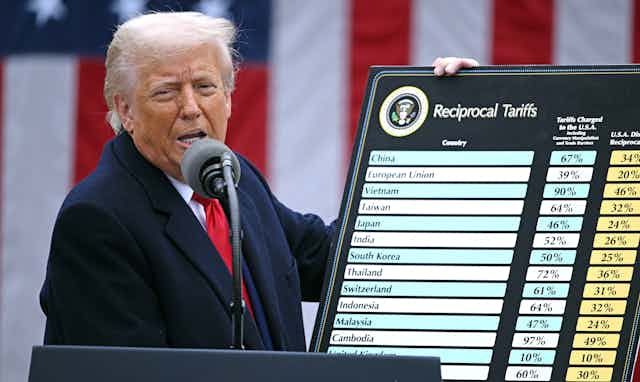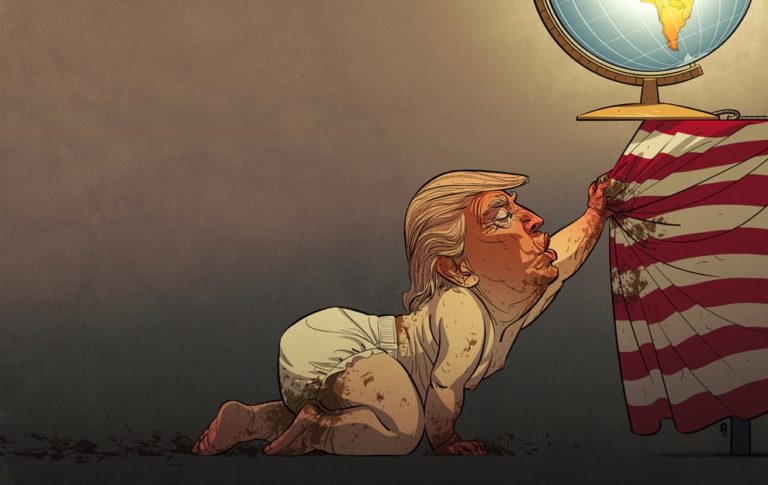
Vox Review:
Michael Moore no longer wants to make you angry.
That’s a weird departure for the filmmaker whose documentaries (Bowling for Columbine, Fahrenheit 9/11, Sicko,etc.) have become known for surveying broad sources of American anger — from gun control to 9/11 to health care — and coaxing something sharper and purer out of them.
Moore’s movies revolve around a simple credo: Anger is an agent for progress. If you get angry enough about an issue, you will fight for (or against) it. And if you fight, you can affect real change.
The documentarian’s past works have all showcased his superhuman knack for riling up and motivating viewers by spotlighting certain societal ills and cultivating maelstroms of frustration and righteousness. But his latest, Michael Moore in TrumpLand, feels more like a summer breeze.
Moore staged his act in a town called Wilmington; it’s located in Ohio’s Clinton County, where residents bleed GOP red despite their home sharing a surname with the Democratic presidential nominee. His show was aimed at all voters, regardless of political affiliation. And its filmic counterpart isn’t nearly as incendiary as you might expect.
Like an unruly ribbon, TrumpLand quickly spirals away from its title, its director and star, and its apparent premise of dropping an incendiary progressive into the guts of a Republican town to start fights and cause conflict. Instead, it offers up a peculiar amalgam that’s part commencement speech, part policy analysis, and part gentle GOP ribbing. Aside from a couple of slapdash comedic interludes (including a fake Trump commercial), it’s just Moore reciting from a podium.
Then in its last third, it curls into a full-on love letter to Hillary Clinton, spurred by Moore’s clearly unshakable fear that she won’t get elected.
He traces Clinton’s life — her work at the legal aid society in Arkansas, the way she changed her name to help her husband get elected in that state, her work in researching universal health care, and the general mistreatment at the hands of the press and politicians she suffered when she was the first lady of the United States.
Instead of trying to incite anger, Moore tries his hand at Midwestern nice, aiming to pry laughs from his audience with jokes about liberal indecisiveness versus conservative convictions, wry observations on Beyoncé’s Super Bowl halftime performance, and testimonials about Clinton being a real person. Naturally, some of them are more effective than others. Here are five takeaways from the film:
Moore is at his best when he talks about young people
The most touching part of TrumpLand comes when Moore morphs into a college commencement speaker and begins talking about millennials. He cracks a couple of shopworn jokes about young people fixing their parents’ printers and electronics, before explaining that what he loves about millennials is that they’re “not haters.”
Moore praises millennials and other young people for being the least racist, least misogynistic, and least homophobic generation America has ever seen. He also notes that for the most part, their “non-hater” status remains intact no matter what political party they belong to.
“They don’t hate someone based on the color of their skin or who they love,” he says, explaining that when it comes to raising children, the baby boomers must have done something right.
It’s earnest, heartfelt, and uplifting. It’s also a testament to the legacies of both boomers and millennials that Moore has found hope in the idea of leaving the country in millennials’ hands. He seems to have faith that fairness and empathy will reign.
And the way Moore talks about young people and the relationship between boomers and millennials in the context of parents being proud of their children is something we don’t often see in pop culture or politics.
The least effective parts of TrumpLand are its occasional pretaped sketches, like a fake Trump commercial and an imagining of Trump’s inauguration.
In one of TrumpLand’s stranger stretches, Moore tries to draw a parallel between an increase in single women in this country, women’s success in schools and white-collar jobs, the disenfranchised straight white male voter, and Beyoncé’s Super Bowl halftime performance from earlier this year.
His hypothesis: that straight white men saw the 2016 Super Bowl halftime show as the allegorical death knell of their power because even though Coldplay headlined, Beyoncé won the night.
“Who here doesn’t like gay marriage?” he asks. When one man raises his hand, Moore exclaims, “Then don’t get gay married! You won’t like it.”
TrumpLand’s strangest feature is that it’s attached to the most volatile and turbulent presidential election America has ever seen.
The film was shot on October 7, during Moore’s performance of the one-man show in Ohio. That’s the same day that audio of Trump bragging about sexually assaulting women was leaked. But it means that at the time, no one knew that Trump would assert that his brags were just “locker room talk,” that multiple women would come forward to accuse Trump of sexual assault, or that Michelle Obama would give a powerful speech about the importance of this election.
In the time that passed between TrumpLand’s filming and its release, Clinton’s numbers rose and Trump’s took a dive. But at the time of filming, the race between the two candidates was, as far as polling can tell us, much closer.
Moore’s urgency in talking about Hillary Clinton’s legacy and trumpeting her career as a public servant was/is a manifestation of his fear. It seems he felt like the media and the race were overlooking those facets of her life, and perhaps they were.
Moore also talks about the generation of women that Clinton grew up with and entered the workforce with, and the adversity they faced in wanting to work. He emphasizes his belief that Clinton, whether you like her or not, will fight for this country.
As a result, TrumpLand becomes an earnest plea to vote for Clinton, from a man who seems genuinely concerned that people don’t see what she is capable of. He’s obviously worried that her campaign hasn’t done enough to prove her worth to skeptical Americans, to the point that he wanted to make this movie to give her some kind of boost.




35 Comments
Pingback: บริษัทกำจัดปลวก หาดใหญ่
Pingback: orale steroide
Pingback: Online businesses
Pingback: lsd blotters xl,
Pingback: 토렌트
Pingback: Hunter898
Pingback: agen slot
Pingback: lsm99
Pingback: navigate to this site
Pingback: coffee relaxing jazz
Pingback: AMBLotto เปรียบเทียบ LSM99 Lotto 2
Pingback: grote blote tieten
Pingback: อะไหล่เครื่องใช้ไฟฟ้า
Pingback: ai nude
Pingback: คลิปหลุดโอลี่เเฟน
Pingback: Morpheus8 รีวิว
Pingback: endolift
Pingback: Rent warehouse Pathum Thani
Pingback: Slot Online ฝากถอนAUTO
Pingback: pompe de caldura aer
Pingback: ลดข้าวดีด ข้าวเด้ง
Pingback: เฟอร์นิเจอร์สไตล์มินิมอล
Pingback: Thai Lottery หวยที่คนไทยทุกคนไม่ควรพลาดกับ LSM99
Pingback: แทงบอลออนไลน์เกาหลี
Pingback: slot99
Pingback: ระบบสมาชิก
Pingback: ข้อมูลเกี่ยวกับบริษัท SBOBET
Pingback: ซักผ้าโรงแรม
Pingback: สมัคร คาสิโน SAGaming เว็บตรงมาแรงอันดับ 1 ต้อง Lsm99
Pingback: magic mushroom gummies
Pingback: 77UP เว็บพนันแทงบอล ออนไลน์
Pingback: chicken road
Pingback: ปั้มไลค์
Pingback: Sugar Rush slot in the UK
Pingback: ฟันเหลืองเกิดจากอะไร